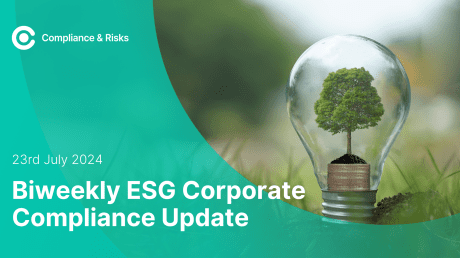
Global ESG Rulemaking: A Tracker of Latest Developments and Key Upcoming Dates

Authored by Joyce Costello, Senior Regulatory Compliance Specialist
Global trends are revealing that compliance-based legal frameworks for ESG reporting and developments are gaining footholds in major markets, and businesses are facing calls from investors, consumers and the broader public to pay greater attention to the risks they pose to the natural environment and social interests, and to the manner in which they are governed.
It is clear that audited financial disclosure already incumbent on corporations, and long-demanded from careful investors, will soon be supplemented in certain jurisdictions with legally-enforceable obligations for the disclosure of ESG-related performance data.
As with all corporate information, enhanced flow will mean greater transparency for stakeholders, and accountability for business leaders who attempt to stymie internal ESG performance standards or who simply ignore them by failing to integrate them into their business strategy.
It is equally clear that climate and environment risks warrant this attention, not only on account of moral/ethical mores, but because they are inextricably linked with enterprise profitability and a return on equity.
In short, flourishing business cannot afford to ignore the approaching tide of regulation on sustainability reporting that could entail significant financial and reputational damage if unheeded.
In the immediate term, companies should be keeping a keen eye on the leading jurisdictions active in ESG reporting law-making, and associated noteworthy dates:
EU:
The EU, which is pursuing a very ambitious and robust ESG framework, has now reached political agreement on the draft Corporate Sustainability Reporting Directive (CSRD), which will substantially extend the number of corporations subject to non-financial reporting obligations, including large non-EU entities and subsidiaries operating on the EU market, under the Non-Financial Reporting Directive (NFRD).
On 10 November a considerable majority of the EU Parliament adopted the proposal, and the focus now shifts to the Council to approve the new reporting requirements.
Under the draft CSRD, an initial set of European Sustainability Reporting Standards (ESRS) should be adopted by 30 June 2023.
Consultation on the mandatory EU sustainability reporting standards to be developed by the European Financial Reporting Advisory Group (EFRAG) closed on 8 August 2022, and on 15 November 2022 agreement was reached on the first set of draft ESRS to be submitted to the EU Commission (subject to editorial changes).
Key upcoming dates: EU Council expected to adopt the proposed CSRD on 28 November 2022, after which it will be published in the EU Official Journal.
The first set of ESRS are scheduled to be adopted by 30 June 2023. Reporting obligations under the CSRD to incrementally come into force between 2024 and 2028:
- From 1 January 2024 for large public-interest companies (with over 500 employees) already subject to the non-financial reporting directive, with reports due in 2025;
- From 1 January 2025 for large companies that are not presently subject to the non-financial reporting directive (with more than 250 employees and/or €40 million in turnover and/or €20 million in total assets), with reports due in 2026;
- From 1 January 2026 for listed SMEs and other undertakings, with reports due in 2027. SMEs can opt-out until 2028.
USA
After suffering a recent setback, the U.S. Securities and Exchange Commission’s proposed Rule for detailed disclosure on corporate environmental impact, with particular attention on greenhouse gas (GHG) emissions, is still on the table.
Adoption of the rules was initially scheduled for the second half of 2022, at the earliest, but recent developments mean that the rules are now actually months away.
Aside from a technical glitch which prompted the SEC to reopen its comment file on the proposal, the decision of the Supreme Court in West Virginia v. Environmental Protection Agency is also being cited as a major threat to the proposed Rule, following the ruling that agencies need clear permission from Congress to create regulations that have major economic or political effects.
The split Congress following the 2022 midterm elections will likely be a major determinant in how much resistance the SEC proposal faces in the months ahead.
The SEC has not been retreating in the face of a considerable backlash against its proposal, however.
On 24 September 2022 the Environmental Protection Agency (EPA) announced the creation of a new national office dedicated to advancing environmental justice (EJ) and civil rights, known as the Office of Environmental Justice and External Civil Rights, which is being viewed as a solid signal that the EPA is willing to use enforcement tools to advance the administration’s environmental justice goals, and that the plan to implement obligatory ESG reporting will not be easily derailed.
This of course will not undermine any obligations on corporations with operations in the EU or in other jurisdictions, and any incongruence in timelines in the development of reporting mandates should be addressed through a robust business strategy to achieve optimum reporting and reduce risk.
UK
The UK is maintaining momentum in ESG reporting obligations, following the enactment of The Companies Strategic Report (Climate-related Financial Disclosure) Regulations 2022 which made sustainability reporting in accordance with the Taskforce for Climate-Related Financial Disclosure (TCFD) compulsory for a number of U.K. companies.
Companies need to also know that, commencing in 2023, economy-wide Sustainability Disclosure Requirements (SDR) will start to be rolled out.
SDR will bring together existing sustainability-related disclosure requirements under one integrated framework and go further with new requirements.
Fully mandatory disclosure is expected by 2025.
On 25 October, the UK Financial Conduct Authority (FCA) published Consultation Paper CP22/20 on proposed Sustainability Disclosure Requirements (SDR) providing an integrated framework to ensure consistency in sustainability disclosures between corporates, financial services firms and investment products.
Firms will be expected to provide investors with climate-related information in line with the new International Sustainability Standards Board (ISSB) standards, and report on their environmental impact using the UK Green Taxonomy.
Key upcoming dates: Consultation period to end on proposed Sustainability Disclosure Requirements (SDR) on 25 January 2023.
Publication of the final rules expected in June 2023. ‘Anti-greenwashing’ rule applicable to all regulated firms, requiring that sustainability-related claims must be clear, fair and not misleading, to commence on 30 June 2023.
ISSB
The ISSB is continuing to progress work on a global baseline of high-quality sustainability disclosure standards, and aims to publish IFRS S1 and IFRS S2 in early 2023.
On 21 October, ISSB announced that Scope 3 emissions would be included in its draft standard IFRS S2 Climate-related Disclosures, along with Scope 1 and 2 emissions.
Scope 3 covers all other indirect emissions from the company’s value chain not covered by Scope 2 and are deemed challenging to quantify and monitor.
However, for concerned parties, ISSB has stated that it will ‘develop relief provisions’ to help companies apply the scope 3 requirements’.
Entities assessing their capabilities and preparedness to apply these exacting proposed standards are also advised that ISSB is currently considering which scalability mechanisms should be explored to help it respond to this issue.
Key upcoming dates: IFRS S1 and IFRS S2 to be published in early 2023.
In spite of the underdevelopment of ESG regulatory regimes in many jurisdictions, companies operating internationally ignore at their peril the growing influence of environmental, social, and governance (ESG) metrics in measuring their organisation’s ethical impact and sustainability practices in important markets such as the EU, UK and United States.
A proactive approach to supply chain transparency and accountability with regard to ESG is sensible even where not yet legally required, to ensure preparedness for the approach of large-scale global ESG reporting obligations.
Stay Compliant With ESG Regulations
Check out our latest blog to learn What’s Coming In 2023 For ESG? or watch our on-demand webinar to learn about ESG Reporting Obligations for the Modern Day Consumer Good
Stay Compliant With ESG Regulations
Learn how C2P can help you stay ahead of ESG regulatory changes and achieve uninterrupted market access.








